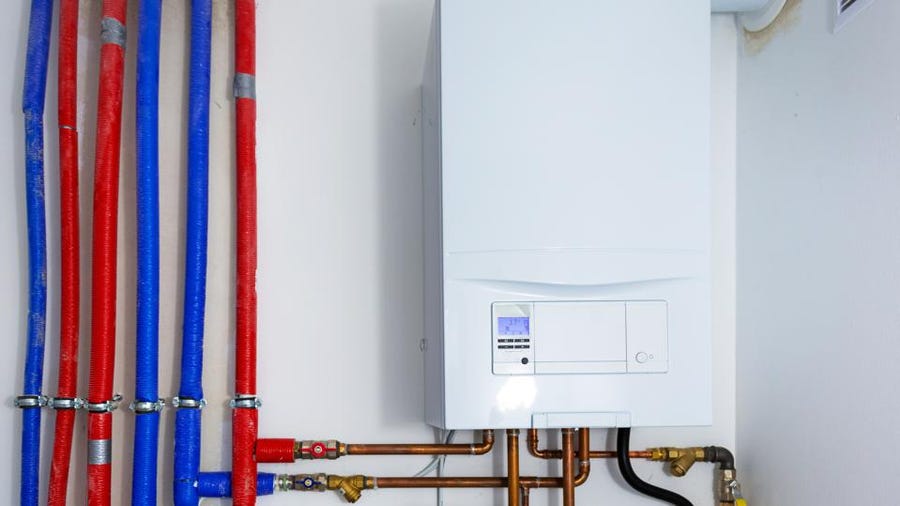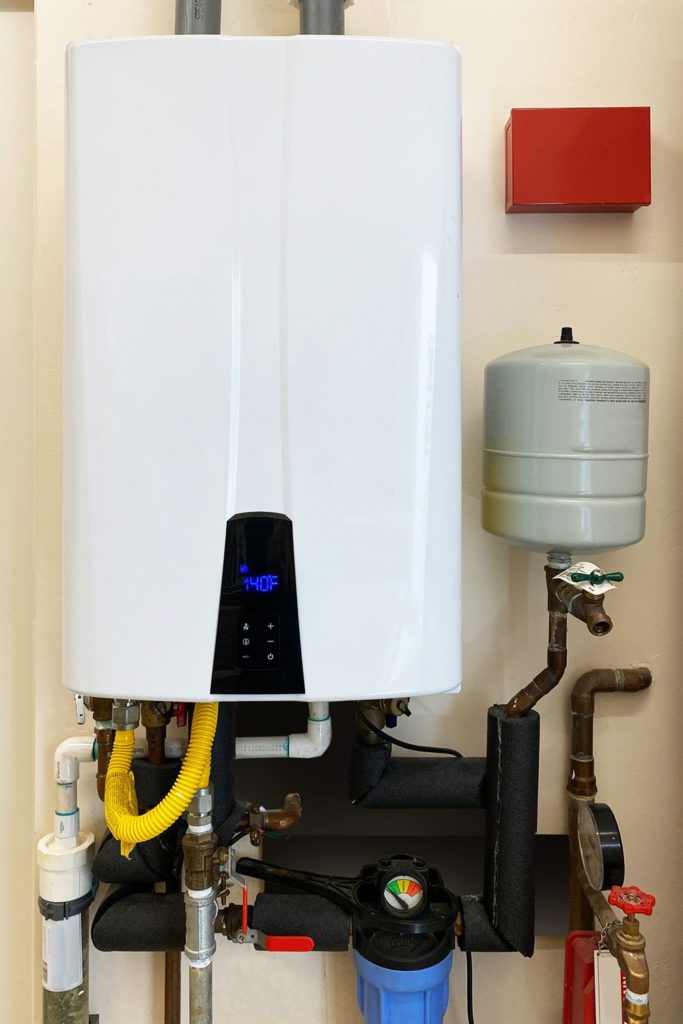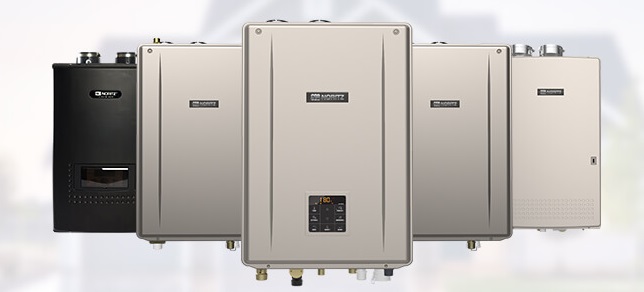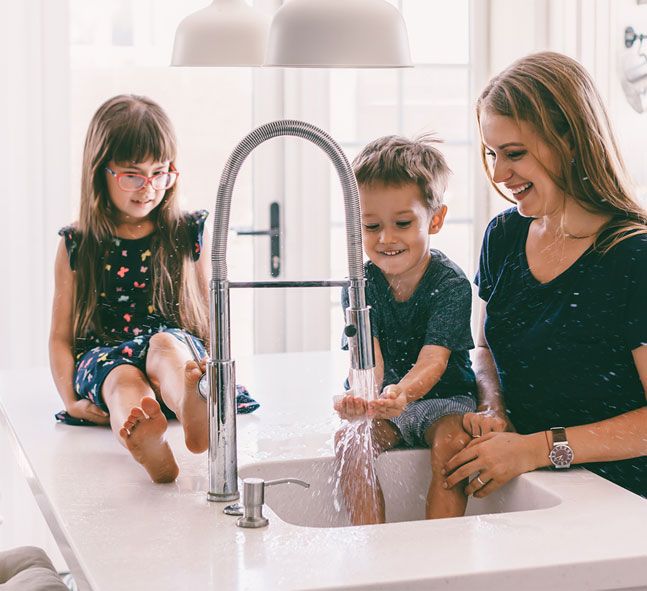Tankless water heaters, also known as on-demand water heaters or instantaneous water heaters, are water heating systems that heat water on demand rather than storing it in a tank like traditional water heaters.
Tankless water heaters heat the water directly as it flows through the unit, using high-powered burners or electric heating elements to heat the water as it passes through the pipes quickly. This is why with instantaneous water heaters, you can have a constant supply of hot water without the need for a large tank to store it in.
On-demand or instantaneous water heaters are becoming very popular due to their energy efficiency and compact size. However, like any appliance, they have their pros and cons. In this article, you will learn about the advantages and disadvantages of on-demand water heaters to help you decide whether they are the right choice for your home.
One of the main advantages of on-demand water heaters is their energy efficiency. Since these water heaters only heat water when it’s needed, they can be much more efficient than traditional water heaters, which constantly heat and reheat water in a tank, even when it’s not being used.
Tankless water heaters also have a smaller footprint than traditional water heaters, which can be beneficial in homes where space is at a premium.
Now if you want to learn more about the pros and cons of tankless water heaters, continue reading.

Pros of Tankless Water Heaters:
Energy Efficiency
One of the main advantages of on-demand water heaters is their energy efficiency. Traditional water heaters constantly heat and reheat a large tank of water, even when it’s not being used, which can lead to significant energy waste. On the other hand, tankless water heaters only heat water when it’s needed, which can result in significant energy savings.
According to current research, tankless water heaters can be up to 34% more energy-efficient than traditional water heaters in homes that use less than 41 gallons of water daily. The energy savings may be slightly lower in homes that use more hot water, but they can still be practical.
Unlimited Hot Water
As told, on-demand water heaters can provide an unlimited supply of hot water, unlike traditional water heaters, which can run out of hot water if the tank is depleted. This is because tankless water heating systems heat water on demand as it flows through the pipes, so hot water is always available as long as the unit is properly sized for the household’s needs.
This is particularly beneficial for larger households or homes with higher hot water demand, such as those with multiple bathrooms or large families.
Space Saving
Tankless water heaters are much smaller than traditional water heating systems, which can be beneficial for homes with limited space. They can be installed on a wall, freeing up valuable floor space that would otherwise be taken up by a large water heater tank.
In addition, tankless water heating systems can be installed in more remote locations in the home, such as in a closet or under a sink, because they do not require a large tank and can be mounted directly to the wall.
If you want to install a tankless water heating system, it is best to contact a professional company for heating system installation services.
Long Lifespan
Tankless water heaters offer a longer lifespan than traditional water heaters. While traditional water heaters typically last 10-15 years, on-demand water heaters can last up to 20 years with proper maintenance.
This means that homeowners may save money in the long run by not having to replace their water heaters as frequently.

Cons of Tankless Water Heaters:
Higher Upfront Cost
One of the main disadvantages of tankless water heaters is their higher upfront cost. These water heating systems can cost up to three times as much as traditional water heaters. The installation costs may also be higher, particularly if additional electrical or gas lines need to be installed.
While the energy savings over time can offset the higher initial cost, it may take several years for homeowners to see a return on their investment.
Limited Hot Water Output
While tankless water heaters can provide an unlimited supply of hot water, they may have a lower hot water output than traditional water heaters. This means that if multiple hot water demands are happening simultaneously, such as multiple people taking showers or running the dishwasher and washing machine at the same time, the water heater may not be able to keep up with the demand, resulting in lower water pressure or cooler water.
To mitigate this issue, homeowners may need to install multiple on-demand water heaters, which can increase the upfront cost and installation complexity.
Need for Proper Sizing
Tankless water heaters need to be properly sized for the household’s hot water needs to ensure they can provide sufficient hot water. If the unit is undersized, it may not be able to keep up with the hot water demands of the household, while an

Are There Different On-Demand Water Heaters Available for Homes?
Yes, different types of tankless water heaters are available for homes, including gas-powered and electric-powered units.
Gas-powered tankless water heaters are typically more powerful and provide higher hot water output than electric-powered units. They use a burner to heat the water and require access to a gas line or propane tank.
On the other hand, electric-powered tankless water heating systems are typically smaller and more compact than gas-powered units, making them a good option for homes with limited space. They use electric heating elements to heat the water and require access to an electrical outlet.
In addition, there are also different sizes and models of tankless water heaters available, with varying hot water output capabilities. It’s important to choose the right size and model based on the household’s hot water needs to ensure that the unit can provide enough hot water.
Some tankless water heating systems also come with additional features, such as digital temperature control, energy-saving modes, and self-diagnostic systems, which can help to improve their performance and efficiency. It’s important to research different models and features in order to choose the right tankless water heater for your home.

Should I Rent or Buy Tankless Water Heaters?
Whether to rent or buy a tankless water heater depends on your individual circumstances and priorities.
Renting a tankless water heater can be a good option if you don’t have the upfront cash to purchase a unit or if you prefer to have someone else handle the maintenance and repair of the unit. Typically, when you rent an on-demand water heater, the rental company is responsible for the installation, maintenance, and repair of the unit, and you pay a monthly rental fee for the duration of the rental agreement.
However, renting a tankless water heater can be more expensive over the long term than purchasing a unit. Rental fees can add up over time, and you may end up paying more than the unit is worth. In addition, you may be limited in your options for the brand and model of on-demand water heating you can choose, as rental companies typically offer a limited selection of units.
Buying a tankless water heater can be a good option if you have the upfront cash and prefer to own the unit outright. When you purchase a tankless water heating system, you have more control over the brand and model you choose, and you can shop around for the best price. In addition, once you’ve paid for the unit, you don’t have to worry about ongoing rental fees.
However, purchasing a tankless water heater means that you are responsible for the unit’s installation, maintenance, and repair, which can be a significant expense over time. If the unit requires repair or replacement, you’ll need to pay for those costs out of pocket. In addition, if you’re not experienced with plumbing or electrical work, you may need to hire a professional to install or repair the unit, which can add to the expense.
Ultimately, deciding whether to rent or buy a tankless water heater depends on your circumstances and priorities. Consider your budget, your willingness to handle maintenance and repair tasks, and your long-term plans for your home before making a decision.
